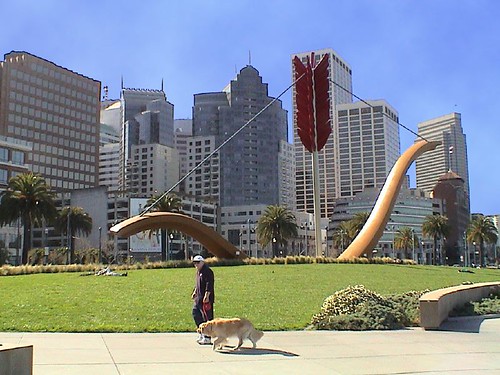
AlterNet: Bush's "Magic" Economic Formula: The Rich Get Richer; Regular People Lose Ground
By Larry Beinhart, AlterNet
Posted on June 4, 2007, Printed on June 8, 2007
Supposedly we are in a sustained economic recovery and have been since 2002.
Part of this is Bush hot air and the Republican Noise Machine, which the media quotes verbatim.
By a certain measure, however, it's real.
The economy has grown. Corporate profits are at an all-time high. Average income is up. There's lots of money around.
But the recovery has some really strange features. Oddities never before seen in a recovery.
Jobs: During Bush's first term the US actually lost private-sector jobs.
It finally improved in 2005, and now job creation is almost keeping pace with the increase in population. Still, over all, it's the worst record since Hoover, the fellow who presided over the onset of the Great Depression.
How do you have a recovery without creating jobs?
Income: Yes, average income is up during the tenure of the current administration.
The joke about average income is: Bill Gates walks into a bar. The average income of every person in the room immediately goes up 10,000 percent.
But median income, the amount that people in the middle of the group earn, barely budges. So let's look at that figure. Median income is down. The average person makes less now than when Bush came into office.
Not only that, the downward pressure on wages is no longer just a blue-collar issue, it's moved up to white-collar workers, the educated classes, even doctors.
How do you have a recovery when people are making less than before the recovery?
Cost of living: Key factors of the cost of living are much higher than they were six years ago.
In particular, fuel is up 100 percent, higher education costs are up about 44 percent, health care premiums are up 80 percent, and affordable housing is scarce.
Normally, when the cost of living goes up, we have inflation. But we've had low inflation during the Bush years.
How can the cost of living go up while the cost of money stays low?
Here's the most peculiar statistic of all: the Dow Jones index
You may have been hearing that the Dow Jones Index is at an all-time high. It's true. However, it is only 16 percent higher than the day George Bush came into office. By comparison, when Clinton left office the Dow was 320 percent higher than when he came into office.
It's a very rough measure of course, and there are many others. But by that measure, during the Clinton years investment in America's leading business had grown more than three times over. Under Bush it's only grown 16 percent in six years. Since the consumer price index is up 18 percent over the same period, when the new all-time high is adjusted for inflation, growth is effectively below zero.
How can there be a "recovery" in which not even businesses grow?
When a government wants an economy to grow, it throws money at it.
The administration did that with spending on pharmaceuticals, homeland security, and a couple of wars. But their most important weapon of choice was tax cuts for the rich, especially on unearned income, capital gains, inheritance, dividends, and interest.
This was sold, and accepted, on the myth that the rich -- the investing class -- are the most creative and daring members of our society. Just unleash them and they will march off into the wilderness -- actual, urban, or cyber -- with sacks of cash over their shoulders and they will build things!
Factories! Airlines! Housing! Toys! Computers! Undreamed wonders! Entire new civilizations! With jobs! jobs! jobs! Like an Ayn Rand novel!
But that's not what happened.
Because a shortage of cash was not the problem. The country, the world, is awash with cash.
The good, old, risk for rewards version of capitalism -- the burghers invest in a daring sea captain sailing to the Indies -- still exists. In recent years, it's given us FedEx, Wal-Mart, Apple, Microsoft, and Google.
But alongside it, over the last 50 years, the economy of credit has grown up.
In vastly oversimplified terms the credit economy works like this:
You own a house. It's worth $100,000.
Someone buys the house, no money down. They borrow that money. Let's say it's a straight-line 8 percent, 30-year mortgage. Forget closing costs, points, and any other complications -- that's a $220,000 debt. It goes on the bank's books as an asset.
Now you have $100,000. The bank has $220,000 (on paper). The buyer has a house worth $100,000. The bank has a lien on it, but the buyer will be gaining equity, plus he can get a second mortgage and home-improvement and other loans on it.
Again, this is a vast oversimplification, but that transaction has "created" something like $420,000 that is now "in play," as part of the economy.
No "thing" has been created -- no new business, no product, no jobs, no idea, no intellectual property, no entertainment.
But money has been created.
If you buy a dress on your Visa card or organize a consortium to buy a company, the same thing happens -- debt creates money. In every transaction, there's profit to be taken off the top.
A perfect example of the transformation of our society into a credit economy is the change in the way we finance higher education. States, and even cities, used to be in the business of building universities that were free, or nearly so. These were financed, up front, with tax money as an investment in our human infrastructure. Then, in 1965, the student loan program was invented. This changed the higher education business into a debt creation business and created a whole new creditor class, college graduates, who, were handed, along with their diploma, debts of ten to fifty thousand dollars or more.
The number one industry in America today is the money business -- debt swapping. In a closed economy, that might have a positive effect, as people look for something to do with their money.
Not, perhaps, as a general rule, but in an economy like ours, handing out money to rich people is the least effective way to make a healthier, stronger economy that benefits society as a whole. There are two reasons.
The first is that the Ayn Rand fantasy is a fantasy. For the most part, when people with millions of dollars get an extra hundred thousand, or several hundreds of thousands, or even millions, they invest it passively, in financial instruments and real estate.
So we get, for example, a real estate bubble. Which is worse that a dot.com bubble because a dot.com bubble is symptomatic of the excitement of investing in new, high risk, but high reward enterprises that are producing new things. A housing bubble is symptomatic of lots of money floating around with nowhere productive to go. The other reason is that insofar as investment does go into business, in terms of our society, there's a hole in the bucket. The hole is called globalization.
I'm writing this on a Mac. When I bought it, the money went through American Express (which took a few points) to Apple's headquarters in Cupertino, California, where Steve Jobs dipped in his ladle, then the rest poured out though the hole in the bottom to China, where it was actually made.
That's the economy that the statistics describe.
Lots of money is moving. As it passes through the company, the company profits. The company isn't going to build anything, so profits are spent on executive compensation. The actual work is outsourced (the money flows out), and no jobs are created. Nor does the actual business grow very much either, except as a middle man, taking American money and passing it on to foreign businesses (and oil producers).
At the same time, this creates downward pressure on normal working people.
Remember those old movies, with 200 men at the factory gate? A foreman inside with three jobs to give out, saying, "You. You. And you. The rest of you, go home." Those three lucky stiffs didn't demand health insurance, pensions, or job security.
Now it's India, Bangladesh, Malaysia, the Philippines, Mexico, Honduras, China, Korea, and many others at the gate. American companies tell their workers they have to be competitive. Not only do wages go down, but benefits begin to disappear.
This is combined strong anti-union and anti-worker efforts by government, supporting the anti-union and anti-worker efforts of major corporations.
This may be bad for America as a society, but the people in the money business love it.
Indeed, it is the trick that makes Bushenomics work for people in the money business. That includes anyone who invests in financial instruments. The problem with pumping out money -- printing money -- is that it can create inflation. Money lenders hate inflation. If I loan out money at 8% and by the time the creditor pays it back, inflation is up 8%, then my profit is zero. The profit margin in lending is -- in a significant part -- the difference between the rate of the loan and the rate of inflation.
Really high inflation, and worse, runaway inflation, is, of course, a threat to everyone. But moderate inflation, with rising wages, favors debtors and hurts creditors.
So how can you pump out money while keeping inflation down?
In Bushenomics you do it by keeping a lid on earned income. Even driving it down. Millions upon millions of people earning a little bit less take away from the pressure of a few people earning millions upon millions more.
That, along with, the flood of low cost goods from low wage countries, helps balance out the inflationary pressure of rising costs in certain particular industries, like oil, health care and higher education.
It's not a question of conservatism vs. liberalism. Of government vs. free markets. All economies are, of necessity, mixed. All governments are concerned with the wealth of their nation. Government decisions will always effect how business operates. The question is, does the way government spends and invests create a sounder and healthier society? Or does it merely make certain sectors and classes rich, while hollowing out our economy?
If we are to invest public funds -- through government borrowing or spending or through simply spending tax revenues -- we have to be aware that rich people running around with bags of money won't necessarily do what is good for the wealth of our nation. They may run us into bankruptcy, the way the smartest guys in the room ran Enron into bankruptcy.
Larry Beinhart is the author of Fog Facts: Searching for Truth in the Land of Spin.
© 2007 Independent Media Institute. All rights reserved.
View this story online at: http://www.alternet.org/story/52955/






